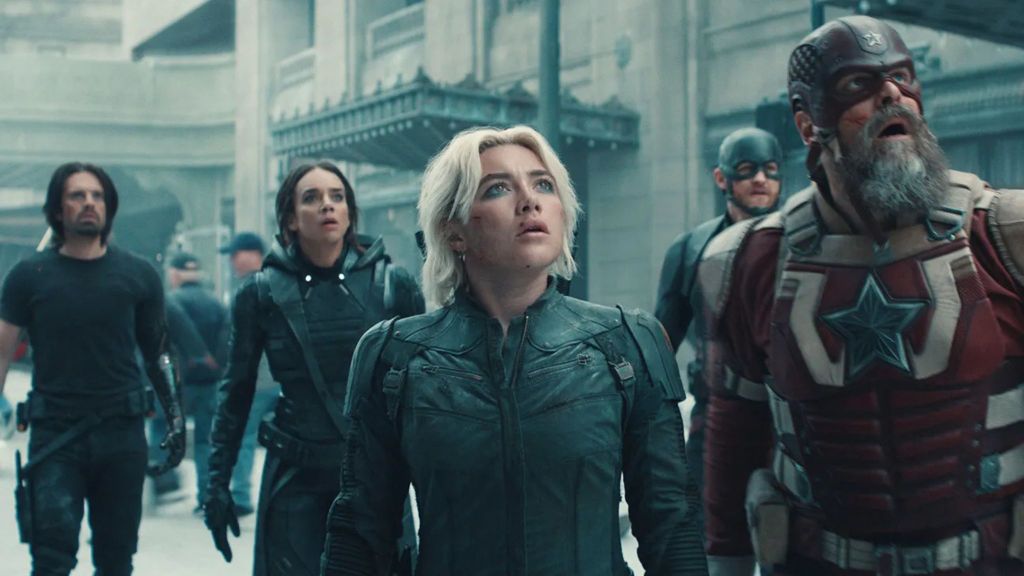Marvel Studios’ Thunderbolts* just stormed into theaters, and the verdict from critics and audiences is overwhelmingly positive. The film, focusing on a team of reformed antagonists like Yelena Belova (Florence Pugh) and Bucky Barnes (Sebastian Stan) tackling the god-level threat of the Sentry/Void (Lewis Pullman), is being praised for its mature themes, strong character work, and emotional depth. It currently boasts a stellar 88% critic score and an even more impressive 95% audience score on Rotten Tomatoes, making it the highest-rated MCU Phase 5 movie on both fronts and placing it among the top-tier audience scores for the entire franchise. However, despite the critical acclaim and audience love, Thunderbolts* pulled in only $76 million domestically and $162.1 million globally at the opening weekend box office. While solid, that domestic number trails the $88.8 million domestic and $192.4 million global opening of Captain America: Brave New World, a film widely considered a disappointment for Marvel Studios. This immediately raises the question: can Thunderbolts*’ critical success translate into the financial success needed to justify its existence?
Videos by ComicBook.com
The pressure is certainly on. Following a string of commercially underwhelming Phase 5 entries like Brave New World, the disappointing Ant-Man and the Wasp: Quantumania, and the outright bomb The Marvels, Marvel Studios needs Thunderbolts* to deliver at the box office. With a reported production budget of $180 million, the same as Brave New World, the film faces a steep climb to profitability in a market showing signs of superhero fatigue and increased competition. Even so, the path forward for Thunderbolts* isn’t entirely bleak, despite the lower-than-hoped-for start compared to its immediate predecessor. After all, opening weekend numbers, while important, don’t always tell the whole story.
How Does Thunderbolts* Compare to the MCU Phase 5?

Phase 5 has undeniably been a mixed bag for Marvel Studios, swinging from staggering highs to concerning lows, both critically and commercially. Ant-Man and the Wasp: Quantumania stumbled out of the gate, landing a Rotten 46% score, though audiences were kinder at 82%. Despite a hefty $106.1 million domestic and $225.3 million global opening off a $200 million budget, the weak critical reception led to a disastrous 70% second-weekend drop. It ultimately limped to $476 million worldwide, falling well short of expectations. Guardians of the Galaxy Vol. 3 provided a much-needed boost soon after. James Gunn’s emotional farewell scored well with critics (82%) and exceptionally well with audiences (94%). While its $118.4 million domestic opening wasn’t record-shattering for its $250 million budget, the stellar reception powered it to a much healthier 49% second-weekend drop and a strong $845.6 million worldwide finish, proving audiences still show up for beloved characters and well-received stories.
[RELATED: Thunderbolts* Has the Most Predictable MCU Death Ever (But It Still Had a Twist)]
Then came The Marvels. Despite a barely Fresh 62% critic score and a decent 83% audience score, the film opened to a franchise-low $46.1 million domestically ($110 million globally) against a reported $270 million budget. The audience score wasn’t enough to counteract the negativity, resulting in a catastrophic 78% second-weekend plummet and a final worldwide gross of just $206.1 million, making it the MCU’s biggest box office bomb. Hope surged back with Deadpool & Wolverine, which smashed records thanks to huge anticipation, nostalgia, and genuinely positive reactions (78% critics, a massive 94% audience). It’s $211.4 million domestic ($446.3 million global) opening obliterated R-rated records, and even with that massive start, it held reasonably well with a 56% second-weekend drop, cruising past $1.33 billion worldwide on a $200 million budget.
Captain America: Brave New World brought things back to earth. Like Quantumania, it suffered critically (48% Rotten) despite a passing audience grade (78%). Its $88.8 million domestic start wasn’t terrible, but wasn’t great for a Captain America film, and again, poor word-of-mouth fueled a steep 67% second-weekend drop, leading to a $414.8 million worldwide total that failed to recoup its $180 million budget plus marketing costs. The lesson here is that movies with higher critics and audience scores keep earning at the box office beyond their opening week. That high audience score is where *Thunderbolts*’s path to success truly lies.
Will Word-of-Mouth Save Thunderbolts* at the Box Office?

In today’s market, especially for big-budget blockbusters, strong word-of-mouth driven by audience satisfaction is arguably more crucial than ever. A film that genuinely connects with viewers can overcome a softer-than-expected opening weekend through sheer staying power. We’re seeing a prime example of this play out right now with Ryan Coogler’s critically adored horror film Sinners. Despite some initial industry skepticism about its $90 million budget for an original R-rated horror concept, Sinners opened strong ($48 million domestic) and then exhibited phenomenal holds, dropping only a minuscule 6% domestically in its second weekend, fueled by near-perfect 98% Rotten Tomatoes scores and rave audience reactions. It quickly surpassed its $225 million breakeven point (based on the 2.5x budget rule) and became a cultural talking point, demonstrating that quality filmmaking and genuine audience excitement can still create a box office hit.
Thunderbolts* finds itself in a similar, albeit higher-budgeted, situation. With a $180 million production cost, it needs to reach the $450 million worldwide mark to be considered financially successful, covering marketing and distribution costs. That’s a significant climb from its $162.1 million global start. However, its 95% audience score is a massive asset. That number puts it in the same league as Guardians of the Galaxy Vol. 3 and Deadpool & Wolverine, films that remained relevant at the box office for several weeks. If that 95% score translates into enthusiastic recommendations and repeat viewings, Thunderbolts* should see much smaller weekly drops than Brave New World or Quantumania. There is potential for Thunderbolts* to leg out significantly, riding a wave of positive buzz.
Thunderbolts* is now playing in theaters.
What do you think? Will the great reviews and audience scores be enough for Thunderbolts* to become a box office success? Let us know your predictions in the comments!








